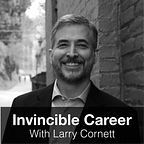
“Are you aware of any tried-and-true methods for making the transition from being a full-time employee at companies in the Bay Area, to becoming a consultant or contractor who is able to reap the financial rewards of providing their skills and expertise? Regardless of career stage.”
I was asked this question recently via my anonymous Q&A form. Some people are okay with working for someone else for several years. But, at some point, they get the itch to break free and start their own business.
Perhaps they want more independence and flexibility in their work schedule. Maybe they’re tired of small raises and occasional promotions, so they want more control over their financial destiny.
Whatever their reasons are, knowledge workers — as I’m guessing this person is — can quickly spin up a business based on what they do. I’ve made this transition myself a couple of times during my career.
I also have several friends and colleagues who have become consultants after years of being employees at Tech companies in the Bay Area. If anything, it has become even more accessible in the last ten years.
I wrote a more detailed article on this very topic: “Can You Channel Your Work Frustration into Creating Your Own Business?” But, I’ll share some specific advice in this newsletter.
What I did
The fastest transition to consultant or contractor is to sell what you have been doing as an employee. Base your service offering on what you already have several years of experience doing in your day-to-day job.
I did this when I first left my comfortable 9–5 job and became a solopreneur in 1998. I quit as a senior designer at a startup and formed a “design agency” in less than a week. I had my first client before I even left my job: my previous employer. I added additional clients over the next few weeks.
I didn’t even bother buying a domain name and creating a website until I had already completed a few projects. Modern social media didn’t exist yet.
The only way people could contact me was via my email and phone. Online advertising mostly consisted of annoying and expensive banner ads.
My primary sources for new clients were through word of mouth and partnerships. I sold what I already knew and could do.
I had been providing my software design services for years as a full-time employee at IBM, Apple Computer, and a couple of startups. The transition to performing design work for clients was almost seamless.
How do you define your business and services?
The value you create for your employer isn’t very different from the services a consultant would sell to your employer to replicate what you do.
A useful exercise is to transform your current detailed job description into a business plan. Describe your proposed services as solutions to the problems that you know your target clients have.
How would a business describe its services if it offered what you do day-to-day? However, keep in mind that the rules change when you are a consultant or independent contractor.
You now have autonomy. You decide how and when the work gets done. You can’t say, “I perform the design work that the manager asks me to do every week.”
I should rephrase that: to be considered “self-employed,” you must decide how you do your work. You must also control how you get paid, get reimbursed for expenses, purchase necessary tools and supplies, and handle other benefits (e.g., health insurance, retirement accounts, vacations).
Remember, you are on your own now. The company isn’t taking care of all of this for you. Talk with an accountant to clarify your company formation and how you will handle banking, accounting, and tax preparation later.
Be very careful that you don’t allow a client to dictate the terms of your engagement, even though many will try to do precisely that. They may want you to work in their office (crazy in these modern times), be available for specific hours each day (e.g., 9 AM to 5 PM), and use one of their corporate laptops.
If you let this happen, you run the risk of being classified as an employee, which completely changes how you and the employer will have to handle payment and taxation. Forget about writing off all of those business expenses on your taxes next year (e.g., your new laptop and all of that software you use).
What do you charge?
Speaking of money, you’ll need to decide what you are going to charge for your services. Before you quit your job, do some internal research.
Find out what your company is paying people to provide the services you are planning for your new consulting business. If your employer hires an outside agency, contractors, or consultants who offer similar services, what are they paid?
You should also do some external research and find out what the market will bear.
What are your friends at other companies paying consultants and contractors?
What are consultants and contractors charging their customers right now?
Do some homework to decide how to price your services. You’ll also need to decide if you charge an hourly rate or a flat rate by the project. There are pros and cons to both approaches.
When you are just starting, it is tricky to estimate a flat rate for projects. You don’t have enough experience yet to know how much work and time a given type of project (and client) will require.
It’s ok to start with hourly billing for client work. But, eventually, you want to shift to selling value delivered, not hours spent.
You shouldn’t be punished financially when your experience enables you to complete projects more quickly. There are significant benefits to project-based pricing and monthly retainers (e.g., predictable, steady income).
How do you find clients?
The hardest part of starting a new consulting business is the cold start problem.
Where do you get your first clients?
How do you build a reputation that will get you hired when you have nothing to show yet?
Why should anyone trust you or believe that you can do great work if they don’t know you?
Ah, there’s the answer right in that last question. Who already knows you and trusts you? Who already knows that you do great work?
Your previous employers and colleagues.
The majority of my consulting clients came from previous colleagues and bosses. Sometimes they would be the ones hiring me. Sometimes they would refer other clients to me. My network fueled my business.
For example:
My very first client was my past employer. I told them that I was quitting to start a consulting agency. They tried to persuade me to stay as an employee. I declined, so they immediately said that they wanted to hire me as a consultant and take all of the hours I could give them.
My next client hired me because an employee on their Design team had worked with me at Apple. They needed another designer to run a few projects since they were overloaded. He told the manager of the team to hire me, and he did.
I was pulled into a large number of projects by past colleagues who were now consulting as well.
Designers would bring me on to partner with them on big projects.
Engineers would tell their clients that their products needed some “design love” and recommended that they hire me to work with the engineering team.
Product managers and various senior leaders would hire me to play the role of Design leaders as they were struggling to find an excellent full-time hire.
Leverage your close network. These are people who already enjoy working with you, trust you, and value the quality of your work.
Reach out to people and let them know that you are consulting now and have some cycles to take on a new project. Never say that you don’t have any clients and act desperate, though.
How will you know that it’s working?
As you build your reputation and portfolio of past projects and clients, you’ll be able to attract new clients who’ve never worked with you before. As the demand rises, you will also be able to increase your rates.
When you have more clients than you can handle and you’re charging what you need to live comfortably, you’ll know that your new business is up and running successfully.
However, always be connecting with people to keep opportunities flowing your way. You can’t slack off on marketing and sales just because you’re busy working on current projects.
You don’t want to get into a repetitive cycle of feast and famine. It still makes sense to aggressively build up a financial cushion that can carry you through months — or even a year — if your client work slows.
If you have too much inbound interest, you can send work to other consultants. Bring people on to help you with projects, and there will be reciprocity.
You have to give to take. Don’t be one of those people that never help others find work; otherwise, no one will think of you and help you either.
As your business scales up, you’ll have to decide how you want to grow to take on more clients.
Do you hire contractors?
Do you start hiring employees?
Do you bring on partners?
How should you diversify your income streams?
Can you create passive sources of income?
These are great questions, and it’s a good problem to have, but I’ll save that for another story.
Good luck!
I hope this helps anyone who is considering the transition from employee to consultant! It’s a rewarding journey, and the freedom is like nothing you’ve ever experienced as an employee.
Reach out to me if you have any other questions or leave a comment below.
This week’s professional development challenge
⭐ Write Your Full Story
The messaging around your story should be aligned across platforms. This includes how you talk about yourself online, in written correspondence, and verbal conversations.
Larry Cornett is a leadership coach and business advisor who runs a supportive online community. He lives in Northern California near Lake Tahoe with his wife and children, and a gigantic Great Dane. He does his best to share advice that can help others take full control of their work and life. He’s also on Twitter @cornett.











